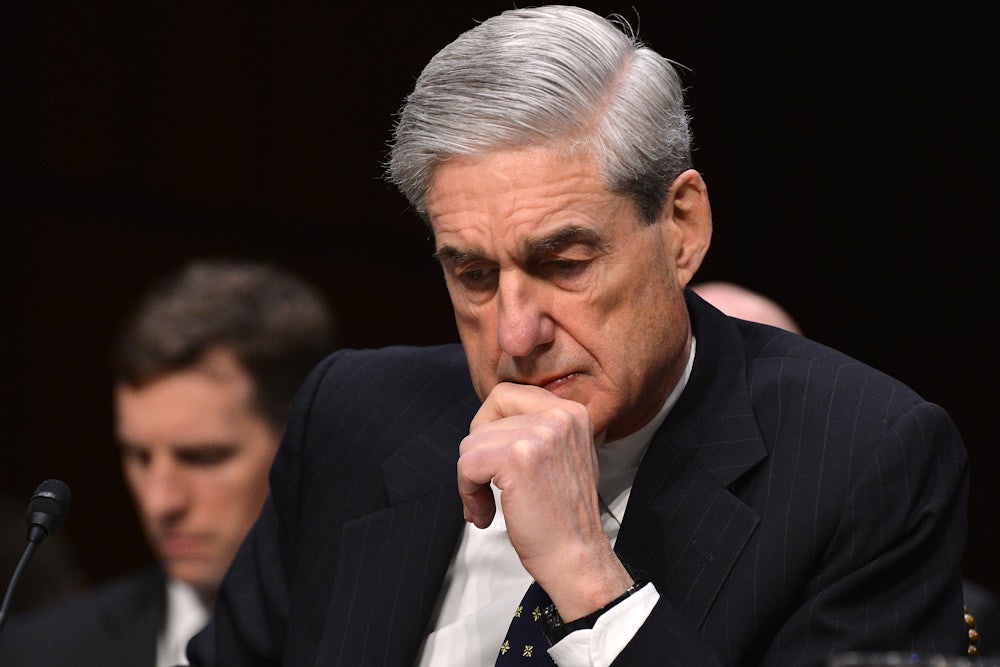When the news broke on Tuesday that Robert Mueller, the special counsel in charge of the Russia investigation, aims to interview President Donald Trump in the coming weeks, some observers considered it a bombshell.
Boom!!https://t.co/sLRzEdPqvp pic.twitter.com/I1Edrs6Pbj
— Benjamin Wittes (@benjaminwittes) January 23, 2018
I think we're going to need a bigger cannon https://t.co/hnHrXOnpWn
— Ruth Marcus (@RuthMarcus) January 23, 2018
Oh, it is on https://t.co/iLlMEUlQxj
— Chris Cillizza (@CillizzaCNN) January 23, 2018
It’s no small matter when a federal prosecutor formally questions a president. That the president is a habitual liar raises the stakes. That his inquisitor is a meticulous investigator and former FBI director raises them even higher.
Synchronize your watches: Donald Trump will commit perjury in... https://t.co/bUxYWh7q1w
— Matt Ortega (@MattOrtega) January 23, 2018
But we always knew this news was coming. Both Trump’s campaign and his early presidency are at the center of the Russia investigation. Even without any suspicion of wrongdoing on his part, it’d be a strange oversight for Mueller not to interview the man sitting atop those structures. He also won’t be the first president to find himself on the opposite side of a prosecutor. Bill Clinton, for example, testified before a grand jury in 1998 during independent counsel Ken Starr’s sprawling Whitewater probe. Clinton’s lies under oath about the extent of his relationship with Monica Lewinsky, a White House intern, eventually culminated in his impeachment.
Recognizing this potential risk, Trump’s lawyers have signaled through the press that they want Mueller to grant some concessions for his interview with the president. The Washington Post reported Tuesday that they’re seeking a combination of oral and written answers to the special counsel’s questions, an arrangement that could shield him from falling into what Trump confidante Roger Stone called a “perjury trap.” Whether Mueller will agree to those terms, as with so many things about the special counsel’s probe, is unclear.
The initial reports suggest that Mueller’s focus for the interview centers on whether Trump obstructed justice by firing FBI Director James Comey. Firing an FBI director to hinder criminal probes into your election’s legitimacy or to shield a political ally from prosecution is obstruction of justice. It would be an attack on the American rule of law, a criminal offense, and an impeachable act. And most legal scholars agree there’s a good chance Trump may have committed it under current federal law.
This may be good news for the president—but only if obstruction of justice is the special counsel’s only topic of inquiry, which could mean Mueller hasn’t found convincing evidence that Trump colluded with the Russian government to tip the election in his favor. It wouldn’t be without precedent to find evidence of a presidential cover-up, but not participation in the underlying crime: Nixon, for example, claimed he didn’t know ahead of time about the Watergate break-in. His efforts to shield those involved from investigators still led to his downfall.
Focusing solely on obstruction wouldn’t exonerate Trump of all wrongdoing, of course. If Mueller believes he has enough evidence to prove the president committed obstruction of justice, he could refer Trump to Congress for potential impeachment charges. It also wouldn’t change the fact that Trump welcomed and weaponized a foreign power’s cloak-and-dagger efforts to undermine Hillary Clinton’s candidacy and the American democratic process for his own benefit—a moral and ethical stain on his presidency that can never be lifted.
A lot of what’s been reported about the Russia investigation can be chalked up to incompetence or cravenness rather than collusion. Maybe Trump and his associates stumbled through a series of contacts with Russian intermediaries that never actually went anywhere. Maybe his advisers cooked something up but kept him out of the loop for plausible deniability. After all, Trump hasn’t shown a strong or engaged leadership style. His campaign itself was a rotating cast of amateurs, ideologues, and family members instead of professional managers and experienced foreign-policy hands. White House officials have spent the last year trying to get him either to embrace his worst instincts (on immigration, for example) or suppress them (by not firing Mueller, alternatively). Maybe these just aren’t very bright guys, and things got out of hand.
The biggest problem with the no-collusion theory, however, is that it doesn’t make sense with the rest of Mueller’s moves. So far, he’s secured two plea agreements: one from George Papadopoulos, who spent ten months as Trump’s foreign-policy aide, and one from Michael Flynn, one of Trump’s top advisers before his ouster last year. They’ve received lighter sentences for lying to investigators in exchange for their cooperation with that investigation.
If there’s no there there, what would they have to offer? Whether Trump fired Comey to help Flynn is a key part of those obstruction questions, of course. But Flynn wasn’t in the White House when Trump pressured Comey to drop the investigation into him, or during the discussions that preceded Comey’s firing in May. And Papadopoulos wasn’t around during the presidency at all.
What we don’t know about the Russia investigation still appears to outweigh what we do know. Papadopoulos’s fiancée told the Post last week that plenty of details about her fiancé’s involvement haven’t been revealed, and that there’s “more to come.” Flynn’s attorney said last March that his client “certainly has a story to tell.” Only Mueller and his team know if that’s true.
